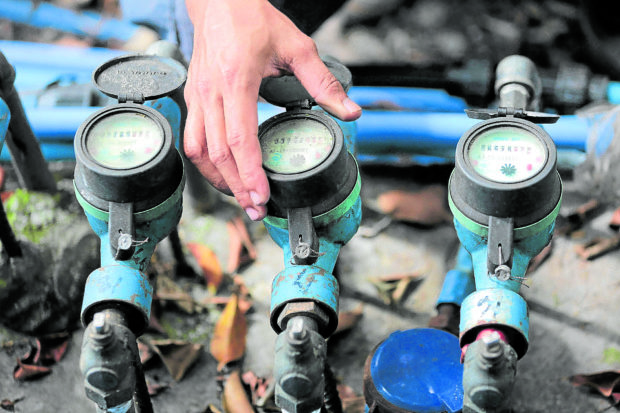‘Railroaded, questionable’: House OKs Maynilad, Manila Water franchises

Following the approval of the measures, several lawmakers chided the quick approval of the bills, with Bayan Muna Rep. Carlos Zarate saying that it seems that the House became a “rubber stamp” after the franchise was approved so quickly. INQUIRER PHOTO / GRIG C. MONTEGRANDE
MANILA, Philippines — The House of Representatives approved the franchises of the country’s two biggest water concessionaires, Maynilad Water Services and Manila Water Companies, but some lawmakers complained that the approval had been railroaded and that the applications had not been thoroughly scrutinized.
During Tuesday’s session, the lower chamber approved House Bills No. 9422 and 9433 on final reading granting a 25-year franchise to Maynilad Water Services and Manila Water Company, respectively.
A total of 206 votes were cast in favor of both measures, 7 against and 0 abstained.
Under the two bills approved by the panel, Manila Water will continue to serve Metro Manila’s east zone, including Rizal province, while Maynilad will continue serving the west zone.
Railroaded?
Following the approval of the measures, several lawmakers chided the quick approval of the bills, with Bayan Muna Rep. Carlos Zarate saying that it seemed that the House became a “rubber stamp” after the franchise was approved so quickly.
Article continues after this advertisementZarate recalled that during the deliberations in the House committee on legislative franchises, it was said that debates would happen in the plenary.
Article continues after this advertisement“Ngunit pagdating sa plenaryo noong June 1, ay agaran din naman itong ipinasa. Hindi pinayagan na magtanong at ilinaw, halimbawa, tungkol sa mga nilalaman ng mga binagong Concession Agreements na pinasok ng pamahalaan at ng dalawang korporasyon,” Zarate said.
(On June 1, however, it was voted immediately in the plenary. For example, no questions or clarifications were allowed about the revised concession agreements entered into between the two corporations and the government.)
Zarate also pointed out that the consumers were not consulted about the new franchises.
Deputy House Speaker Lito Atienza echoed this position, saying that he did not see a “democratic process” in the approval of the franchises.
“‘Yung mga tatanungin naming mga issue, hindi na take-up sapagkat hindi pinag-usapan dito sa plenaryo at doon sa committee,” Atienza said.
(The topics we would like to ask will not be taken up in the plenary nor the committee because they have not been discussed here yet.)
“Bakit natin bibigyan ng pribilehiyo itong dalawang korporasyon na ito samantalang hindi sila tumutupad sa kanilang agreement sa gobyerno?” he added.
(Why should we give these corporations this privilege when they are not fulfilling their agreements with the government?)
‘Questionable’ provisions
Gabriela Rep. Arlene Brosas, meanwhile, dubbed as “alarming” a franchise provision that grants eminent domain powers to water companies.
Under the franchises, the water companies are authorized to “install and maintain its water pipelines and other facilities over, under, and across the public property, including streets, highways, parks, and other similar property of the Government of the Philippines.”
Furthermore, they have the authority to “acquire private property” for their operations.
But Brosas said in the old concession agreement between the water companies and the government, this power resides in the Metropolitan Waterworks and Sewerage System (MWSS).
“But under these franchise bills, the power of eminent domain is explicitly granted to the private concessionaires. The private sector grantees are given the upper hand to expropriate private property under the broad justification of efficient establishment, improvement, upgrading, rehabilitation, maintenance, and operation of its services,” Brosas said.
“The President has repeatedly chided the private concessionaires for their poor service and the supposed questionable provisions in the concession agreement. But here we are, approving the franchise for another 25 years for the same concessionaires without the slightest sense of inquiry into the matter,” she added.
To recall, in 2019, President Rodrigo Duterte ordered the Department of Justice (DOJ) to review the concession agreements with the two water companies because these agreements contain onerous terms that disadvantage the government and the people.
The DOJ then presented its recommendation on the terms and conditions for water concessionaires in November 2020, which Duterte approved “in principle.”